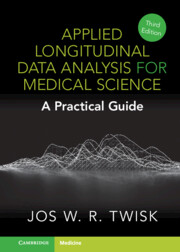Book contents
- Applied Longitudinal Data Analysis for Medical Science
- Applied Longitudinal Data Analysis for Medical Science
- Copyright page
- Dedication
- Content
- Preface
- Acknowledgements
- Chapter 1 Introduction
- Chapter 2 Continuous Outcome Variables
- Chapter 3 Continuous Outcome Variables: Regression-based Methods
- Chapter 4 The Modelling of Time
- Chapter 5 Models to Disentangle the Between- and Within-subjects Relationship
- Chapter 6 Causality in Observational Longitudinal Studies
- Chapter 7 Dichotomous Outcome Variables
- Chapter 8 Categorical and Count Outcome Variables
- Chapter 9 Outcome Variables with Floor or Ceiling Effects
- Chapter 10 Analysis of Longitudinal Intervention Studies
- Chapter 11 Missing Data in Longitudinal Studies
- Chapter 12 Sample Size Calculations
- Chapter 13 Software for Longitudinal Data Analysis
- References
- Index
Chapter 8 - Categorical and Count Outcome Variables
Published online by Cambridge University Press: 20 April 2023
- Applied Longitudinal Data Analysis for Medical Science
- Applied Longitudinal Data Analysis for Medical Science
- Copyright page
- Dedication
- Content
- Preface
- Acknowledgements
- Chapter 1 Introduction
- Chapter 2 Continuous Outcome Variables
- Chapter 3 Continuous Outcome Variables: Regression-based Methods
- Chapter 4 The Modelling of Time
- Chapter 5 Models to Disentangle the Between- and Within-subjects Relationship
- Chapter 6 Causality in Observational Longitudinal Studies
- Chapter 7 Dichotomous Outcome Variables
- Chapter 8 Categorical and Count Outcome Variables
- Chapter 9 Outcome Variables with Floor or Ceiling Effects
- Chapter 10 Analysis of Longitudinal Intervention Studies
- Chapter 11 Missing Data in Longitudinal Studies
- Chapter 12 Sample Size Calculations
- Chapter 13 Software for Longitudinal Data Analysis
- References
- Index
Summary
In Chapter 8, longitudinal data analysis with a categorical outcome variable is discussed. The discussion includes simple methods which are mostly based on the change in proportions as well as regression-based methods, such as multinomial logistic mixed model analysis. Inn addition, longitudinal data analysis with a count outcome variable is also discussed. Regarding this, both Poisson GEE analysis and Poisson mixed model analysis can be used. When the count outcome variable suffers from overdispersion, negative binomial GEE analysis and negative binomial mixed model analysis can be used. Both longitudinal Poisson regression and longitudinal mixed model regression give rate ratios as effect estimates and the results of both methods are comparable. All methods in this chapter are accompanied by extensive real-life data examples.
Keywords
Information
- Type
- Chapter
- Information
- Applied Longitudinal Data Analysis for Medical ScienceA Practical Guide, pp. 134 - 151Publisher: Cambridge University PressPrint publication year: 2023
